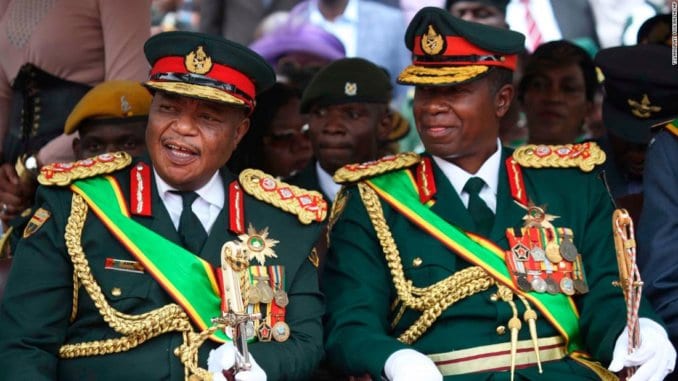Nancy Mabaya/Mary-Kate Kahari
VANCOUVER/HARARE– In all but the political destruction of the ruling Zanu PF party, President Emmerson Mnangagwa’s administration is likely going to be slapped with a fresh dosage of economic sanctions and other restrictive measures by the US, European Union (EU) and Britain, Spotlight Zimbabwe, can exclusively report.

African diplomatic sources in Washington this week revealed that, they had received information from their counterparts working for Brussels and London, confirming that US President, Donald Trump, was considering issuing an executive order on a fresh round of sanctions against Zimbabwe, as his administration is increasingly convinced that another military coup is about to take place in Harare, and bring about a fully fledged military dictatorship, that migh be led by Vice President, Rtd General Constantino Chiwenga, and current Zimbabwe Defence Forces (ZDF) Commander, General Philip Valerio Sibanda.
An executive order is a signed, written, and published directive from the President of the United States that manages operations of the federal government. They are numbered consecutively, so executive orders may be referenced by their assigned number, or their topic.
Trump has signed more executive orders than his predecessor, Barack Obama, in the first three years of his first term, according to a report in the UK Independent a few days ago.
“The US is preparing to deal with a fully fledged military dictatorship in Zimbabwe, as they’re increasingly convinced that another military putsh is imminent,” said the diplomats. “To that effect we hear President Trump is considering to issue a presidential executive order with a fresh regime of sanctions and other measures against your government. Proponents of the new sanctions inside his government circles, reportedly want Harare’s diamonds to be classified as blood diamonds amid allegations of forced labour and exploitation by the Chinese at the Marange fields.
Furthermore they is also a feeling that Russia is propping Zimbabwe, as Mnangagwa has allowed them to come in and mines diamonds and platinum. Zimbabwe’s defence cooperation with Moscow, is also seen as a threat to Washington’s foreign policy objectives in Southern Africa.”
Mnangagwa who was in Sochi, attending the innaugural Russia-Africa summit this week, confirmed that Zimbabwe is interested in defence industry cooperation with Russia, but was not seeking arms.
“No, we don’t have any specific military equipment that we are seeking but we continue to collaborate,” Mnangagwa told Russian media.
Another envoy who works close to the African Union Representational Mission to the US in the American capital said, Zimbabwe should expect the EU and Britain to pass similar fresh sanctions, as they always take their lead on Harare from Washington.
“Yes Britain which is about to leave the European Union, and the EU are also likely to adjust their own sanctions regime against Zimbabwe in line with the US, because they’re allies. That’s no secret. I don’t see these sanctions being removed, not until at least 2023, depending on who wins elections that year. They will review them, but not remove them.”
In March, the British government came up with regulations to maintain sanctions against Harare in place when London leaves the EU.
The regulations were published by the Foreign and Commonwealth Office in a memo prepared for the British Parliament.
“These Regulations are intended to ensure that the UK can operate an effective sanctions regime in relation to Zimbabwe after the UK leaves the EU,” reads part of the memorandum.
“Bringing this sanctions regime into UK law using the powers in the Sanctions Act will enable all the sanctions measures to continue to operate effectively after the UK leaves the EU, as well as enabling Her Majesty’s Government to amend and lift the sanctions, or impose further sanctions, autonomously.”
Former US leader George W. Bush issued the first executive order to impose sanctions against Zimbabwe on March 6, 2003, as domestic violence in the country threatened to destabilize the region. The sanctions took aim at the late President Robert Mugabe and his political associates.
The U.S. Treasury Department’s Office of Foreign Assets Control (OFAC) established the Zimbabwe Sanctions Regulations on July 29, 2004, which placed the sanctioned Zimbabweans on the Specially Designated Nationals and Blocked Persons (SDN) List. Placement on this list generally blocks the U.S. assets of these individuals and prevents U.S. persons from conducting business with them.
Bush signed two additional executive orders to expand sanctions against the then Mugabe regime on Nov. 22, 2005, and July 25, 2008, for “undermining Zimbabwe’s democratic processes and institutions.”
Mnangagwa, who replaced Mugabe following an army coup in 2017, is also on OFAC’s SDN List.
Mnangagwa has provided 265 buses to ferry people from the country’s 10 provinces for today’s anti-sanctions march, to be held at the National Sports Stadium.
Spotlight Zimbabwe, is the first online Zimbabwe publication to report on fears of another imminent coup in the country, which might topple Mnangagwa and replace him with VP Chiwenga, or ZDF boss General Sibanda, should his health continue to fail.
Mnangagwa, is allegedly plotting to disappear from the country into exile once toppled from power by the army or his own ruling Zanu PF party by June 2020, high level sources in the Office of the President and Cabinet (OPC) revealed early this week.













